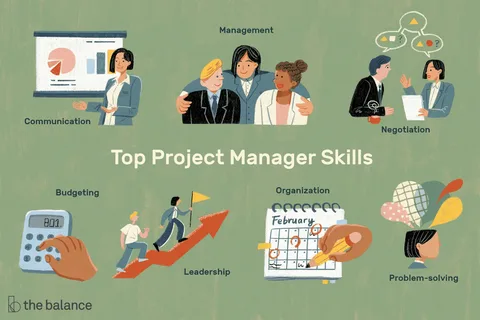Project management is an intricate discipline that combines art, science, and leadership to ensure the successful delivery of projects, whether they are construction, technology, or service-oriented. At its core, project management expertise encompasses a wide range of skills and knowledge vital for navigating the complexities of project execution, from planning and execution to monitoring and closure. (Visit: Project Management Expertise)
For anyone interested in honing their project management skills, Woodpeckers Global is a valuable resource offering comprehensive training and resources to transform aspiring project managers into effective leaders.
Defining Project Management Expertise
Project management expertise can be defined as the ability to apply knowledge, skills, tools, and techniques to project activities in order to meet the project requirements. This includes a deep understanding of project life cycles, methodologies (like Agile, Waterfall, and Lean), and best practices, as well as soft skills such as leadership, communication, and conflict resolution.
A project manager with expertise navigates through the varied phases of a project, ensuring that it meets its established goals by managing time, cost, quality, and scope. Through adept resource allocation and stakeholder engagement, they maintain the project’s alignment with organizational objectives.
The Significance of Project Management Expertise
In today’s fast-paced business environment, project management expertise is not merely beneficial; it’s essential. The significance of this expertise is underscored by exhibition booth design several key aspects:
- Improved Efficiency and Productivity: With effective project management, organizations can streamline processes, avoid redundancy, and reduce wasted resources. For instance, consider how a software company used agile project management techniques to shorten its product development cycle by 50%, allowing for faster releases and increased market competitiveness.
- Risk Management: Project managers are adept at identifying and mitigating risks that can derail a project. A construction firm, for instance, may encounter unforeseen challenges like regulatory changes or supply chain disruptions. Here, an experienced project manager can anticipate these risks and create contingency plans, thus minimizing potential damage.
- Stakeholder Satisfaction: By fostering clear communication and maintaining alignment with stakeholder expectations, project managers uphold relationships and support. A digital marketing agency that used project management principles saw a significant increase in client satisfaction scores after adopting systematic project tracking and status updates.
- Strategic Alignment: Projects should serve the larger goals of the organization. Expertise in project management helps to ensure that projects are aligned with strategic objectives, thereby maximizing value delivery. Companies that effectively integrate their projects with overall strategy tend to outperform their competitors.
Challenges and Misconceptions about Project Management Expertise
Despite its myriad benefits, project management expertise is often misunderstood, leading to challenges that can hinder its effectiveness.
- Misconception of Project Management as a Box-ticking Exercise: Many view project management as a procedural checklist rather than a vital function involving deep planning, flexibility, and strategic thinking. Addressing this fear involves showcasing successful projects where skilled project management has directly correlates with increased performance and success.
- Resistance to Change: Implementing project management practices can meet resistance from employees entrenched in traditional methods. Overcoming this challenge involves providing training, illustrating the long-term benefits, and fostering a culture of collaboration.
- Underestimating Soft Skills: Technical knowledge alone does not guarantee project success; soft skills like leadership, negotiation, and emotional intelligence are equally important. Promoting a holistic approach to project management training can aid in dispelling this misconception and underscore the importance of interpersonal skills.
Practical Advice for Implementing Project Management Expertise Effectively
The journey to harnessing project management expertise requires both strategic planning and continuous learning. Here are a few actionable steps for individuals and organizations looking to build their project management capabilities:
- Invest in Training and Certification: Encourage team members to pursue relevant project management certifications like PMP, PRINCE2, or Agile methodologies. These certifications provide structured knowledge that can be directly applied to real-world scenarios.
- Adopt Appropriate Methodologies: Understand and select the right project management methodologies that align with specific project requirements and organizational culture. For example, Agile methodologies work best in dynamic environments requiring quick adaptations, while Waterfall is suited for projects with well-defined requirements.
- Utilize Project Management Tools: Leverage project management software to enhance planning, resource allocation, and progress tracking. Tools such as Asana, Trello, and Microsoft Project can significantly improve organizational efficiency.
- Foster a Culture of Communication and Feedback: Encourage open lines of communication among team members and stakeholders. Regular feedback helps to identify potential roadblocks early and improves team dynamics.
- Continuous Learning and Improvement: Project management is an evolving discipline; hence, staying updated on new trends, tools, and techniques is crucial. Attend workshops, webinars, and conferences to keep skills sharp and knowledge current.
Conclusion
In conclusion, project management expertise stands as a cornerstone to organizational success in today’s complex business landscape. By understanding its definition, recognizing its significance, addressing common challenges, and taking proactive steps toward its implementation, organizations can reap substantial benefits. The journey towards mastering project management is ongoing and requires dedication, but the rewards in efficiency, risk management, and stakeholder satisfaction are well worth the effort. With the right tools, methodologies, and mindset, anyone can contribute to a project’s success and, by extension, their organization’s growth.


